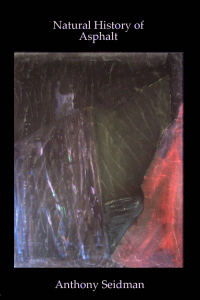 Natural History of Asphalt
Natural History of Asphalt
by Anthony Seidman
Oneiros Books, 2013
116 pages / $9.98 Buy from Oneiros Books
The prose poems of Anthony Seidman’s Natural History of Asphalt are every bit as hard as the “vast and ugly” avenues of North Hollywood – the San Fernando Valley town where the poet makes his home. They are dark as pitch but, under a certain slant of light, they shimmer. They rise from the Valley’s potholed roads and parking lots, which reverberate with paved-over scars and traumas, like waves of refracted light in the blazing desert heat: “Sunday, the San Fernando Valley is a plain of empty parking lots, with the Tongva gone, bones under the macadam. Their women of ochre-smeared faces now dance and feast in the underworld. Their men hunt ghost deer. All the juniper-berries they desire. All the yucca and jackrabbit.”
Like these parking lots, in a country where every day is a travesty of summer, the poems are hot to the touch, even blistering. In one of the most powerful pieces in this collection, a young Latino boy runs to a corner store for a Hershey bar, scorching his tender bare feet: “I set the boy down and hold up his feet to see the damage; his soles are now two blisters, in parts parchment yellow, in other parts translucent sheaves of epidermis. One blister rupture, mustard colored plasma oozes thick as penicillin.” At the end, when the boy is being carted away in a Fire Department ambulance, the poet finds himself unwittingly – but wholeheartedly – adopting the injured and frightened child. These poems call us to adopt what we never intended to own – towns seemingly scrubbed of any real humanity, full of circumspect strangers with whom we haven’t a word in common. But a living heart beats beneath the asphalt, and “Christmas lights flicker over the bar-top.” We are surprised by a pride of place: “These foothills, chaparral, are my country, these gas stations, these sub-par public schools, vacant lots and miles of asphalt… they are the sigil I behold through smog.”
This proud peace, at which the poet arrives after long nights at the Hotel Insomnia, grants him a relief from the despair of those for whom language is more than hard currency. For Seidman, words are synesthetic sore spots, triggering waves of sensations that flow out and fade into the bleak landscape: “In my glossolalia, the word emerald is glacial. Cold and chiseled, not from elms, but from ice so cold it’s flecked with green under crystalline sunlight, For some reason, I see black wood and suji screens, odor of tea steaming in the syllables, suzerain.” These transcendent associations clink against the unambiguous glare of neon, against the “metal shop and junkyard.” “Un-sense me,” the poet demands, “and scent me a language like thumping a club against dung.”
But the story of Natural History is one of reconciliation, the recognition of the transcendent in the cold light: “When the unemployment check arrives, my mouth puckers dry; I look west and see the cobalt neon tubes shaped like a crab, and the cerulean word: MARISCOS.” He is drawn here for “one thing, the way a widow goes to the shore to see the waves swell then dissolve on the same, like pain swelling, then ebbing.” But he is not alone – he is among men who “remember gold that glitters beneath darker currents.” And when we realize with the poet that “All of us are marooned here,” at the landlocked bar Las Playas, the taste of loneliness, which is “acrid, aspirin on the tongue,” slowly melts away.
***
Boris Dralyuk teaches Russian literature at UCLA and has translated several collections of poetry and prose from Russian and Polish. He received first prize in the 2011 Compass Translation Award competition and, with Irina Mashinski, first prize in the 2012 Joseph Brodsky / Stephen Spender Translation Prize competition. He is co-editor, with Robert Chandler and Irina Mashinski, of the forthcoming Anthology of Russian Poetry from Pushkin to Brodsky (Penguin Classics, 2014).
***
An abbreviated version of this review appeared in Ragzine.cc.
Tags: Anthony Seidman, Boris Dralyuk, Natural History of Asphalt

[…] reasons for switching from natural asphalt to the refined petroleum asphalt were processing and haulage costs. Refined asphalt gave a much […]